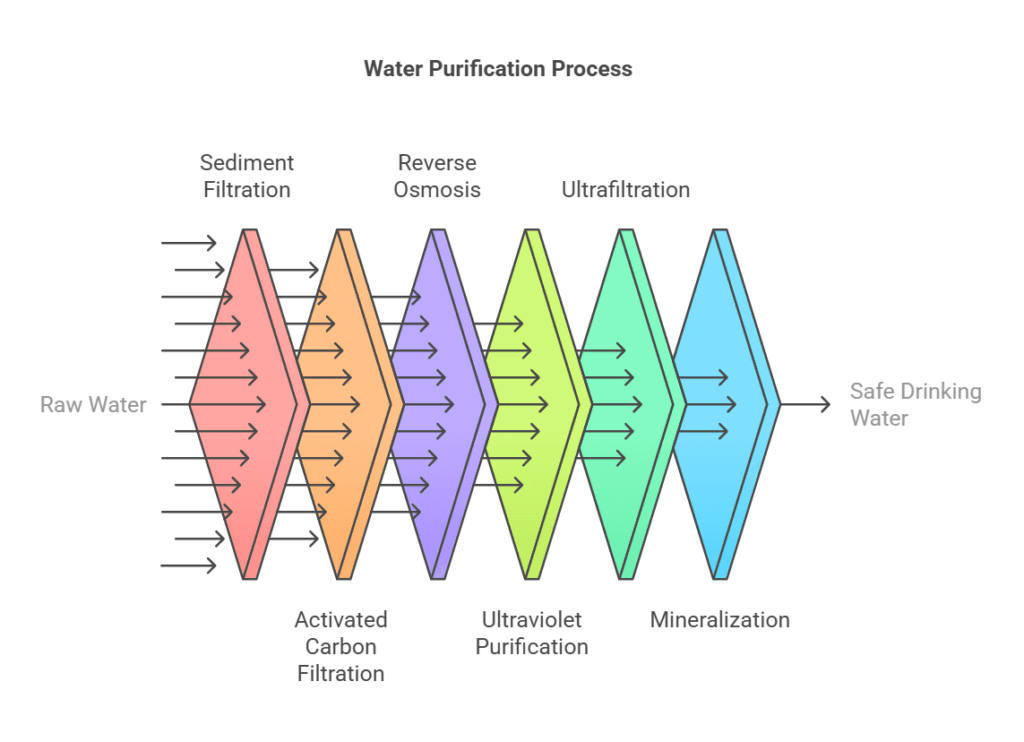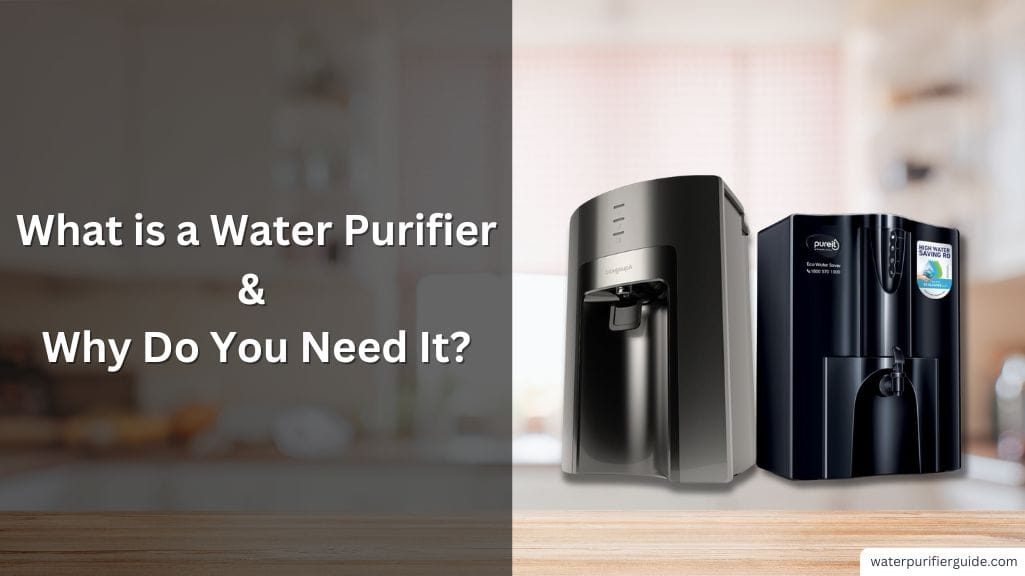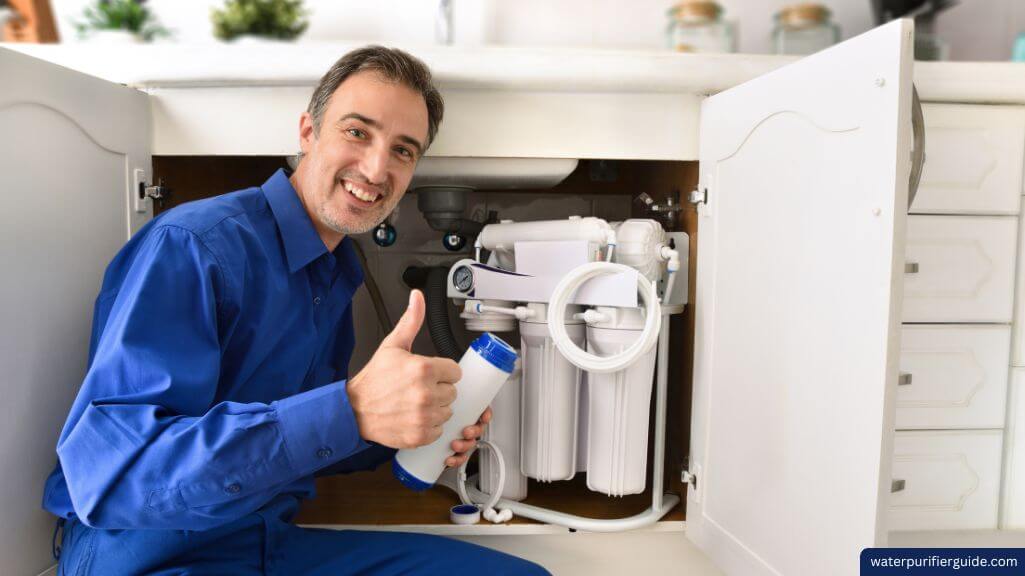What is a Water Purifier? Water purifier is a device that purifies water by removing impurities, bacteria, viruses and other harmful elements present in it. It helps protect you and your family from diseases. Nowadays many types of water purifiers are available, which make water clean and safe using different technologies.
As water pollution is increasing, the need for clean drinking water is also increasing. For this reason, people are now considering it necessary to install water purifiers in their homes. It not only protects against diseases, but also gives you pure and refreshing water.
How Does Water Purifier System Work?
When dirt, bacteria, viruses and chemicals get mixed in the water, it is no longer fit for drinking. In such a situation, water purifier makes the water safe and pure by removing these impurities. For this, it cleans the water in many levels (steps). This is called multi-stage filtration process.

Multi-Stage Filtration Process
- Sediment Filtration: First of all, this filter removes clay, sand and other large particles present in the water.
- Activated Carbon Filtration: It eliminates chlorine, pesticides and bad smell, thereby improving the taste and quality of water.
- RO (Reverse Osmosis) Filtration: It removes small chemicals, heavy metals (lead, arsenic) and bacteria present in the water through a membrane.
- UV (Ultraviolet) Purification: In this, UV light destroys bacteria and viruses, making the water infection free.
- UF (Ultrafiltration) Filtration: This membrane stops even the smallest germs present in the water and makes it safe.
- Mineralization and TDS Control: This process maintains the necessary minerals in the water and corrects the balance of TDS (Total Dissolved Solids), making the water healthy.
Why Do We Need a Water Purifier?
Water is very important for your health, but do you know whether the water you are drinking is completely safe or not? Unpurified water may contain many harmful elements, which can pose a threat to your health. In such a situation, Water Purifier becomes necessary, because it removes impurities and gives you pure and safe water.
1. Dangers of Impure Water
If you drink unfiltered water, you may have to face many diseases. Some of the dangerous elements present in impure water are as follows:
- Bacteria and viruses – can cause diarrhea, cholera, typhoid and other stomach diseases.
- Heavy metals (Lead, Arsenic, Mercury) – can have a bad effect on the liver, kidneys and nervous system.
- Chemicals & Chemicals – Can cause cancer and hormonal problems.
- TDS (Total Dissolved Solids) – Can spoil the taste of water and cause mineral imbalance in the body.
2. How does a Water Purifier Protect Your Health?
Water purifiers have several advanced technologies that help purify water:
- RO (Reverse Osmosis) – Removes dissolved impurities, heavy metals and TDS present in water.
- UV (Ultraviolet) Filtration – Makes water infection free by killing bacteria and viruses.
- UF (Ultrafiltration) – Blocks dirt and bacteria, but retains minerals present in water.
- Activated Carbon Filter – Eliminates chlorine, pesticides and odor from water.
3. Health Benefits of Drinking Pure Water
If you drink pure water daily, you get many health benefits:
- Improves digestive system – Impure water can cause stomach infections, while pure water keeps digestion healthy.
- Strengthens immune system – Water free from bacteria and viruses increases your immunity.
- Healthy skin and hair – Clean water improves skin and strengthens hair.
- Protects liver and kidneys – Water purifier protects your kidneys and liver by removing toxic elements present in impure water.
Important Points to Remember:
- Unpurified water may contain bacteria, viruses and heavy metals, which can cause serious diseases.
- Water purifier gives you pure and safe water by removing impurities.
- Technologies like RO, UV, UF and Carbon filters help in completely purifying the water.
- Drinking pure water keeps your health better, improves digestion and strengthens the immune system.
What to Look For in a Water Purifier?
If you are thinking of buying a water purifier for your home, then you should pay attention to some important features. Every purifier comes with different technologies and features, but to make the right choice, you have to understand your needs. Let’s know the main features, which you should pay attention to.
1. Filtration Technology
There are many types of filtration technologies in water purifiers. The right choice depends on the quality of water:
- RO (Reverse Osmosis) – If the TDS in your water is high, then this is the best option.
- UV (Ultraviolet) Purifier – Effective in killing bacteria and viruses.
- UF (Ultrafiltration) Purifier – Works without electricity and makes water bacteria free.
- Activated Carbon Filter – Removes chlorine and odor from water.
Tip: If the TDS of water in your house is more than 200, then a purifier with RO+UV+UF will be best.
2. Storage Capacity
If there are frequent power cuts in your area, then you should buy a purifier with more storage.
- 3-5 liters – For small families or less water needs
- 6-10 liters – For medium sized families
- More than 10 liters – For big families or more water usage
Tip: If the water supply is not regular, then buy a purifier with large storage capacity.
3. Maintenance Requirements
Every water purifier needs to be cleaned and maintained from time to time.
- RO and UV purifiers require service every 8-12 months.
- UF and gravity-based purifiers have low maintenance and run even without electricity.
Tip: Choose a purifier from a brand whose service and spare parts are easily available.
4. Energy Efficiency
- RO and UV purifiers are dependent on electricity, so it would be better to choose a low power consumption model.
- UF and gravity-based purifiers work even without electricity, which saves electricity.
Tip: If you are concerned about power consumption, opt for an energy-efficient model or a non-electric purifier.
5. Certifications & Standards
- NSF (National Sanitation Foundation) – It guarantees that the purifier makes water safe and pure.
- WQA (Water Quality Association) – It certifies the quality and performance of the purifier.
- ISI mark and BIS certification – It indicates that the product meets Indian standards.
Tip: Always buy a purifier from a certified and trusted brand, so that you get safe water.
Make an Informed Choice:
- Choose the right Filtration Technology as per the water quality.
- Look for the Storage Capacity as per your family’s need.
- Prefer brands with low maintenance and good service support.
- Choose Energy-Efficient models to save electricity.
- Always trust purifiers with certifications like ISI, NSF, WQA.
What are the Benefits of a Water Purifier?
Your health depends on how pure water you drink. Nowadays many diseases are spreading due to impurities present in water. In such a situation, installing a water purifier can be a wise decision. It not only gives you clean and safe water, but is also beneficial for your health and the environment. Let’s know the main benefits of using a water purifier.
1. Improves the Taste and Smell of Water
If your tap water smells or tastes strange, it may be due to chlorine, sulfur or other impurities present in it. Water Purifier improves the quality of water by filtering it and makes it tasty and fresh.
- Activated carbon filter improves the smell and taste of water by removing chlorine and other chemicals.
- RO filter purifies water by removing excess salts and metals.
2. Prevents Waterborne Diseases
Drinking impure water can lead to serious diseases like diarrhea, typhoid, cholera, hepatitis. Water purifiers eliminate bacteria, viruses, fungi and parasites, keeping you and your family safe.
- UV Purifier destroys bacteria and viruses.
- RO technology removes heavy metals and harmful chemicals from water.
3. Cheaper and Economical than Bottled Water
If you buy bottled water every day, it can prove to be quite expensive. Water purifier is a long-term investment, which gives you pure water at home at an affordable price.
- Bottled water is expensive, while water purifier works for a long time once purchased.
- Bottled water needs to be bought every time, but with a purifier you can get pure water at home.
4. Protects the Environment
Bottled water comes in plastic bottles, which harm the environment. If you use a water purifier, you can reduce plastic waste and contribute to saving the environment.
- Less use of plastic bottles reduces waste.
- Energy is saved in making and recycling bottles.
- Helps in keeping the environment clean.
Important Takeaways
- Water purifier improves the smell and taste of water.
- It protects you from diseases by removing bacteria, viruses and harmful chemicals.
- It is economical as compared to bottled water and provides long term benefits.
- It helps protect the environment by reducing plastic waste.
Common Myths and Facts About Water Purifiers
Do you think that boiled water is completely safe? Or do you believe that all water purifiers are the same? Many people are victims of misconceptions about water purifiers, due to which they can take wrong decisions. Let’s know the truth of some common myths (misconceptions).
1. Myth: Boiling is enough, no need for a purifier
Fact: Boiling water only kills bacteria and viruses, but does not remove heavy metals (lead, arsenic, mercury) and chemicals (pesticides, chlorine, fluoride) present in it.
- Purifiers with RO and UV technology not only kill bacteria, but also remove harmful chemicals and metals present in water.
- If your water has high TDS (Total Dissolved Solids), boiling will not make any difference, instead you will need a RO water purifier.
2. Myth: All water purifiers are the same
Fact: Different purifiers are made for different needs. Not all purifiers have the same technology or capability.
- RO purifier works well in places where water has high TDS.
- UV purifier kills bacteria and viruses, but it does not remove TDS and chemicals present in water.
- UF and gravity-based purifier purify water even without electricity, but they are not suitable for water with high TDS.
So, choose the right purifier as per your needs and not just by looking at the brand or price.
3. Myth: Water purifiers remove essential minerals too
Fact: This belief is not completely correct.
- RO purifiers remove extra minerals from water, but many brands nowadays come with a mineral cartridge or TDS controller, which retains the essential minerals.
- Not all minerals are beneficial. For example, toxic elements like arsenic and lead can also be dissolved in water, which are dangerous for health.
- Best option: Choose purifiers that have mineral technology, so that along with removing impurities from the water, essential minerals are also retained.
A Quick Recap
- Boiling alone does not make water completely safe as it does not remove chemicals and heavy metals.
- Every water purifier is different, so choose the right technology as per your need.
- Not all minerals are essential, some can be harmful. Purifiers these days come with mineral balancing technology.
Frequently Asked Questions (FAQs)
If you are thinking of buying or using a water purifier, then you must have many questions in your mind. Here are the answers to some Frequently Asked Questions (FAQs), which will help you make the right decision.
Q1. After how much time should I change the purifier filter?
Answer: It is important to change the filter regularly, so that the purity of the water is maintained.
- Sediment Filter: Change every 6-8 months (to remove dust and soil).
- Carbon Filter: Change every 8 to 12 months (to remove odor and chemicals).
- RO Membrane: Change every 1 to 2 years (to remove heavy metals and chemicals).
- UV lamp: Check every 1 year and replace if needed (to kill bacteria and viruses).
If water flow slows down or taste changes, check the filter immediately.
Q2. Can a water purifier remove all contaminants?
Answer: This depends on the type of water purifier you have.
- RO purifier: Removes heavy metals (lead, arsenic, mercury) and chemicals.
- UV purifier: Eliminates bacteria and viruses.
- UF purifier: Removes dirt, bacteria and viruses but not chemicals and heavy metals.
- Carbon filter: Removes chlorine, odor and organic impurities.
If your water has high TDS, then RO purifier will be the right choice. If there are only bacteria and viruses in the water, then UV or UF purifier will be sufficient.
Q3. Is RO water safe to drink?
Answer: Yes, but it is important to keep some things in mind.
- RO purifier removes harmful metals and chemicals from water, making the water safe.
- Some people say that RO also removes minerals, but nowadays most RO purifiers come with mineral cartridge or TDS controller, which maintains the essential minerals.
- If the TDS of your water is less than 200, then there is no need for RO. In this case UV or UF purifiers are the right choice.
Q4. How much electricity does a water purifier consume?
Answer: It depends on the type and usage of the purifier.
- RO and UV purifiers: consume a little more electricity (on an average 25-60 watts per hour).
- UF and gravity-based purifiers: These work even without electricity.
- If your RO purifier runs for 5-6 hours daily, it may consume 1-2 units of electricity per day.
To avoid excessive electricity consumption, choose an energy efficient model and do not keep the purifier on for more than necessary.
Conclusion
So far you have learned what is a water purifier and why it is important. Drinking clean water is not just a habit, but a necessity for your good health. Nowadays, water contains harmful elements like bacteria, viruses, heavy metals, and chemicals, which can have a bad effect on your health. In such a situation, a good water purifier helps protect you and your family from diseases.
If your water has high TDS, then you will need a RO water purifier. If there are only bacteria and viruses in the water, then a UV purifier can be a good option. And if you want a cheap and easy solution, then a gravity-based purifier is also a good option.
Give Priority to Clean Water!
Drinking pure water not only keeps your health good, but you also do not have to face diseases again and again. So, check the quality of your water and choose the right water purifier for your needs.
📌 Sources & References
The information in this article is based on publicly available data from trusted government bodies, health organizations, and water research institutions to ensure accuracy and relevance for Indian households.
- Britannica – Water Purification: Description, Processes, & Importance
[Comprehensive overview of what water purification is, why it matters for public health, and key contaminants addressed through purification.] - US EPA – Drinking Water (Public Health & Contaminants)
[Explains how untreated water contaminants (microbes, chemicals) affect health and why treatment is necessary — useful background for “why water purifiers are needed.”] - CDC – How Water Treatment Works
[Describes the treatment steps that make water safe (e.g., filtration, disinfection) — foundational context for how purifiers extend safety to homes.] - ACS Publications – Point of Use Household Drinking Water Filtration
[Scientific review of household-level filtration technologies that remove pathogens and other contaminants — directly relevant to explaining purifier mechanisms.] - India Water Portal – WHO Compendium: Technologies & Frameworks for Safe Drinking-Water
[Explains current WHO drinking-water systems and technology frameworks, contextualizing household purification within broader safe water goals.] - Wikipedia – Maximum Contaminant Level (MCL)
[Overview of regulatory thresholds for drinking water contaminants and why such standards motivate the need for purification at the point of use.]




